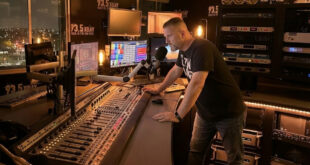
At only 17 years old, Zoe Wees already has a uniquely captivating voice that instantly gets under your skin. But it’s her story that really calls one’s attention.
Growing up in an underprivileged part of Hamburg, Zoe has had to carry a heavy burden from an early age: She develops childhood epilepsy as a young girl and has since lived a life in fear of the loss of control over her own body.
Her single mother, her aunt, and her grandparents provide a sense of security for the girl, but in school, Zoe finds herself being excluded by her peers. With seizures sometimes happening several times a day, her illness is a constant companion, requiring her to seek medical attention on a regular basis.At the one place where her family isn’t there to help, her teacher selflessly steps in: She accompanies Zoe day in, day out, throughout this formative phase in her life.
Zoe finds refuge in the world of music, and at the age of 14 she encounters a music teacher that recognizes her potential.The two of them begin making music together, and,thanks to her deep dedication,even manage to have the schedule changed, in order to work on voice training and expression. They go on to release videos of song covers and play first shows.
This experience has come in handy for Zoe at the studio. Since 2018, she’s been working together with the producers Patrick Pyke Salmy and Ricardo Muñoz (who wrote Lost Frequencies’ “Love To Go” and produced and co-wrote German radio top 10 hits like “Back To The Start”, “Keep Me Up” and “All I Need” by Michael Schulte and Adel Tawil’s “Tu M’appelles” among others). The songwriters Emma Rosen aka VVAVES and René Miller (Topic feat. A7S “Breaking Me”) are helping her with writing her first self-composed tracks. The special constellation of artists and the strong bond of trust they share, has enabled the young talent to tap into her deepest fears and to tell her moving story, which she is now sharing with the world.
Zoe about her debut single “Control”:
“I’m so happy that I can finally tell the story of the most important and also the most difficult phase of my entire life with my first single ‘Control’. The song served as the most direct way to process and tell my own story. It was painful to write but also very healing. The process was therapeutic, giving me an opportunity to contain the fear and to deal with the pain. Losing control during my seizures made me feel claustrophobic, and that affected everything I did. The confrontation that takes place through my music has a healing power. ‘Control’is also intended as a thank you to my teacher who helped me through the darkest time in my adolescent life. She protected me and cared for me, and even offered stability and support to my entire family. The first time I played her the song we both cried. I am forever grateful to her! This song has enabled me to cope in a way that I hope also helps other people who are dealing both with similar and with completely different problems. It captures all of my energy, my soul, and the feelings of pain, helplessness, and gratefulness all at once. I hope the people listening to it can feel the same dedication that I do.”
 slowjams.com AS SEEN ON SHARK TANK: Home of Sunday Night Slow Jams® and the world's leading source for Slow Jams
slowjams.com AS SEEN ON SHARK TANK: Home of Sunday Night Slow Jams® and the world's leading source for Slow Jams
